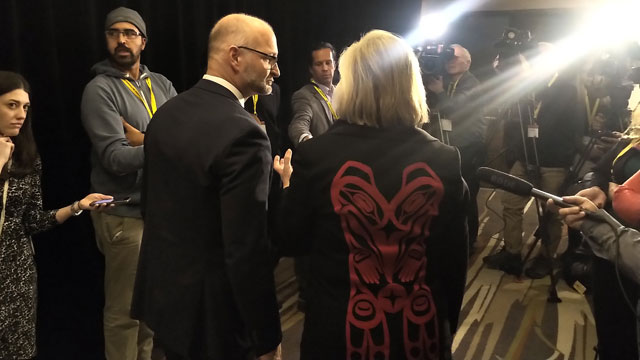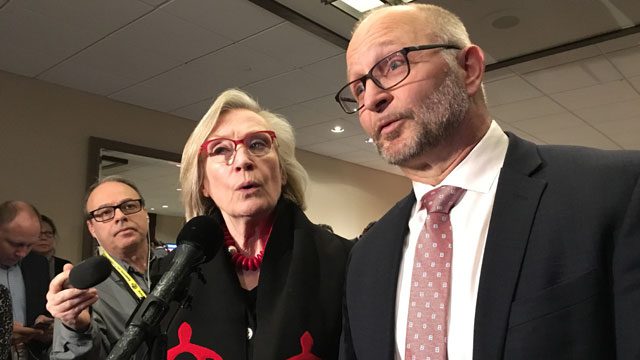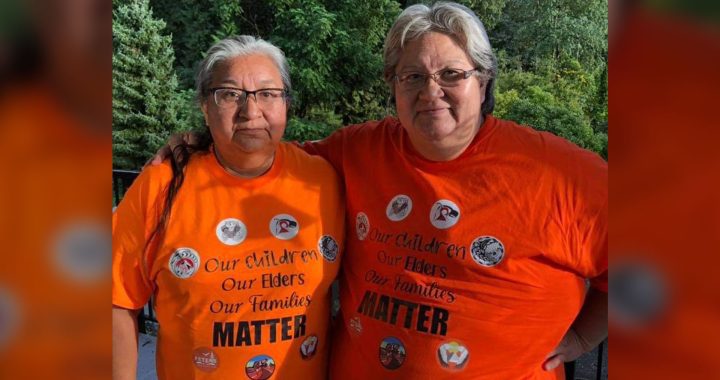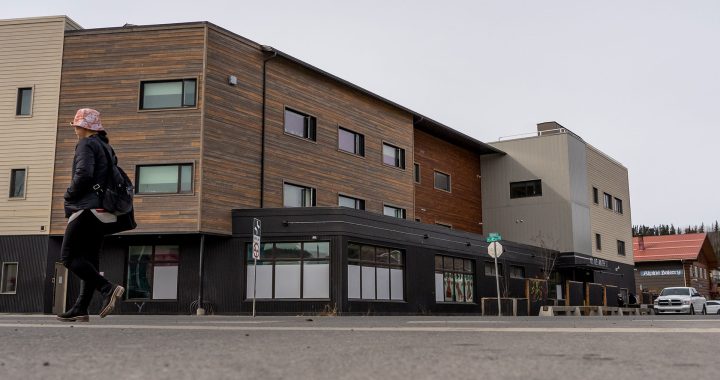

Twenty four hours after B.C. Premier John Horgan was lauded by First Nation chiefs for adopting the UN Declaration on the Rights of Indigenous Peoples (UNDRIP), Justice Minister David Lametti said Canada would soon do the same.
Minister of Crown Indigenous Relations Carolyn Bennett said she felt “real excitement” among First Nations in B.C. after the bill’s passing, and that it represents a significant step in decolonizing the country’s justice system.
“It recognizes the relationship and the everlasting partnership between a provincial government and Indigenous peoples,” Bennett told reporters at the Assembly of First Nations gathering in Ottawa.
Lametti said UNDRIP may be legislated by 2020 giving the first concrete date for the proposal.
More from APTN’s Jamie Pashagumskum.
Opening the AFN special chiefs’ assembly Monday, National Chief Perry Bellegarde said this implementation was his top priority while conferring with national representatives on a host of other issues.
While Lametti did not offer details on exactly when – or how – this would be achieved, he did make one thing abundantly clear.
“I am not my predecessor,” he said, referencing former federal justice minister Jody Wilson-Raybould, who was ousted from the Liberal caucus earlier this year and now sits in the House of Commons as an independent.
During the 2016 AFN summit in Niagara Falls, Wilson-Raybould said that while Canada embraced the declaration and the parameters it set, adopting it into law would be “unworkable.”
“Simplistic approaches such as adopting the United Nations declaration as being Canadian law are unworkable and, respectfully, a political distraction to undertaking the hard work actually required to implement it back home in communities,” she told delegates at the time.
Former NDP-MP Romeo Saganash – Cree from Waswanipi – tabled Private Member’s Bill C-262 in Parliament in 2016 asking for UNDRIP’s implementation- saying he was “devastated” when the bill was “left to die” in the final legislative stages.
And despite news of progress, speakers stepping up to the mic to address Lametti commented on his perceived slight towards Wilson-Raybould.
“I want you to also know: don’t be shy about saying the name of your predecessor,” a B.C. regional chief said, garnering applause. “The Honorable Jody Wilson-Raybould is our friend and our colleague. So don’t be shy about saying who she is.”
“I’m really glad Wilson-Raybould’s issue came up today, in regards to your ‘former colleague,’” added another chief, who offered no introduction. “Us as First Nations people, we’re very proud people – and she was one of the first Indian people appointed as a justice minister.”
But questions about timely and thorough consultation remain.
Two years ago, Bennett said Canada would meet with First Nations, Inuit and Métis before moving to codify UNDRIP into Canadian law.
It is unclear whether these consultations were completed before Lametti’s announcement, or whether the consultation agenda has set to be set. Bennett called it a “living document,” one that will continue to evolve as time goes on.
Calls to Justice
Meanwhile. regional chiefs and activists for missing and murdered Indigenous women and girls expressed concerns about where the government stood on implementing the National Inquiry’s 231 Calls to Justice.
In a scrum with reporters Tuesday, Bennett revealed Canada has “something in the window” and would be issuing its response to the final report by June – in time for the report’s one-year anniversary.
Bennett said the government has been taking time to consult with Indigenous communities, leaders, and organization to ensure the action plan is co-developed with First Nations, and dismissed any notion the government is taking too long to act on the inquiry’s findings.
“Co-development will be the key to getting this right,” she said. “But we know the plan has to be built on the wise practices of Indigenous women – those with lived experience, and those with expertise. Those who see themselves in the plan.”
In response to that news , Christine Chicago, whose cousin Verna Simard – a mother of five – died in Vancouver after falling from a hotel balcony, took to Twitter to refute that claim.
“As a #MMIWG family member, I am disappointed in the lack of involvement of families in the development of the National Action Plan. Where is the accountability?” Chicago wrote, tagging Bennett, Minister for Women and Gender Equality Maryam Monsef, and Ontario Regional Chief RoseAnne Archibald.
“Justice must be high on the agenda of the new parliament,” Archibald said at a press conference Tuesday, where residents of Grassy Narrows chided the federal government for stagnating on a promise to build a mercury care home for the ailing.
Chief Rudy Turtle said the Liberals were taking a “paternalistic” approach to Indigenous issues, instead of adhering to promises to foster a nation-to-nation relationship.
“We talk about moving from paternalism to partnership,” Bennett told reporters. “But I think you know I believe there will only be a partnership if you believe that it feels like a partnership.”
“You are setting the path for decolonization and reconciliation,” she added.
There’s no doubt – as evidenced by the questions and comments made to both Lametti and Bennett by Indigenous leaders – that legal support and other policy changes are necessary to the success of any co-developed strategies moving forward.
During his opening remarks, Bellegarde called upon government officials to address the “crisis” of discrimination in the penal system, where Indigenous peoples are disproportionately represented.
“According to the latest figures, Indigenous adults made up roughly 30 percent of new admissions to federal, provincial, and territorial prisons in 2017-2018, yet we represent less than 5 per cent of the population,” Bellegarde said.
“There have to be realistic alternatives to incarceration. We have to move to restorative justice systems, not punitive justice systems,” he added. “We need Indigenous peoples’ court.”
Despite being a relatively new face in Parliament, the national chief said he feels Lametti “has his heart in the right place.”
Indigenous realities
During his public address on Tuesday – his first ever at the AFN – Lametti spoke of the need to reform the judicial system to be more accommodating of Indigenous realities.
“One legal system has completely engulfed the other one, allowing the majority to impose its laws on the minority – the essence of colonialism,” Lametti said.
“It does not need to be this way,” he added. “We have a responsibility – I have a responsibility as a minister to the Crown, to re-think this approach.”
Lametti, who is also attorney general, announced support of an interim measure while awaiting the MMIWG action plan: a three-year funding extension for FILU – Family Information Liaison Units – a tool that is helping Indigenous families in their quest for answers where missing and murdered Indigenous women are concerned.
FILU – according to the Department of Justice’s website – is a relatively new service that helps families “access available information about their missing and murdered loved ones from multiple government sources,” and are available in every province and territory.
Funding was set to expire in March 2020, but the ceiling was raised based on its success and utility, according to Lametti.
“We know the need for support and for answers hasn’t ended [and] we want to make sure important services continue to be available moving forward,” he added.
And amendments have been made to address concerns particular to First Nations, Lametti said.
When Grand Chief Brian Hardlotte from Prince Albert, Sask., used the Colten Boushie case as evidence of the need for reform in jury selection, for example, Lametti cited Bill C-75 – an act that amended procedural issues within the Canadian Criminal Code.
Lametti did ask chiefs and councils to keep an eye on how this amendment is applied on the ground; the hope is that it will reduce the number of people incarcerated for less serious offences – something Hardlotte said he takes to heart, considering Prince Albert’s alternative measures program for offenders is often fighting for funding.
But like Marc Miller, the minister of Indigenous services said Tuesday, the issue weighing most heavily on Lametti’s mind – and heart, he said – is the divisive debate surrounding the Canadian Human Rights Tribunal’s order to compensate children apprehended on-reserve as a result of a deeply flawed child welfare system.
Lametti said Canada’s request for a full judicial review of the decision has given Canadians the impression the government is reneging on its commitment to reconciliation, and is moving backwards.
“I want to be crystal clear: First Nations children and their families have suffered, and have been hurt. Canada has caused that pain, and it is our responsibility to help them heal – which includes fair and equitable compensation.”
“Our issue with the Tribunal’s decision is about how it interpreted the law, and the limited exclusionary path it has set out for revenue. But make no mistake. These children have suffered, and it is Canada’s responsibility to repair the damage,” he added.
Some hope about child welfare comes in the impending implementation of Bill C-92 – an Act respecting First Nations, Inuit and Métis children, youth and families – which comes into effect January 1st.

(A coalition continues to press the federal government to drop its appeal of the CHRT ruling. APTN)
As 2020 kicks off, C-92 will see the implementation of new national standards and principles for child welfare decisions, including the right for Nations to pass their own laws and affirm their inherent rights for self-government over children and families “clearly written in law” with a structure to work with, according to the AFN.
However, once again concerns were raised about the government’s preparedness to implement these new policies and change the paradigm around child welfare in the new year.
“Each solution is going to be different depending on the community; it’s going to be contextual, it’s going to reflect the needs of the community,” Lametti told reporters. “There isn’t a one-size fits all solution to C-92. But the commitment is to co-develop this with different communities as they are ready to come forward.”
“We have to go from apprehension to prevention.”
Bellegarde will issue his closing statements to the AFN delegation Thursday afternoon, followed by the Throne speech by Governor General Julie Payette signalling the official opening of Parliament.
-With files from The Canadian Press










Excellent reporting, well balanced and thorough. What a refreshing change.